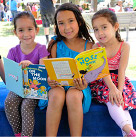Mental health is an important aspect of our well-being, yet many people ignore or neglect their mental health. May is Mental Health Awareness Month and we’re bringing attention to the different ways mental health disorders may affect children, parents, and families, as well as some strategies for addressing those concerns.
Mental Health for Adults
Mental illness affects more than 50 million Americans, according to the National Alliance on Mental Illness. The spectrum of mental health disorders is vast and includes depression, anxiety, schizophrenia, bi-polar, and other diagnoses. While some people will be best served addressing their mental health with a physician, others can combat general feelings of sadness or anxiety with self-care.
“Sometimes it’s really difficult to make time but it’s all about perspective, as well,” said CCRC Mental Health Consultant Elizabeth Cabadas. “With families who really don’t have time – maybe they have two jobs or a single parent household – I’ll ask them what they really enjoy in their day. It may be taking a hot shower or bath, going for a walk, or having a cup of coffee. Focus on that activity and how it brings you joy. It could be something as simple as being mindful about those things – like with a cup of coffee, next time you go and buy yourself a new creamer so when you are enjoying your coffee, it feels extra special.”
For parents and caregivers, taking care of their own mental health is a lot like an oxygen mask on a plane: you must secure your own before you can help others. Taking time to reflect on how you’re feeling and what may be prompting these feelings is important to do regularly. Sometimes feelings of sadness or frustration can be resolved with a little activity. This year’s Mental Health Awareness Month theme is “Movement: Moving more for our mental health.”
“For me, I like to have a set work time and getting out of work at that time and then doing something I enjoy, like talking to a friend or taking a walk,” said Cabadas. “Self-care for other people may be taking breaks or specific activities like standing up, making tea, socializing with co-workers. Figure out what it looks like for you so that when things do come up, you know what to do. And if you don’t know who your support system is inside or outside of work, figure that out so you know who to go to when you’re having a hard day.”
Here are some resources for adults:
- Discovery Resource Center
- Mental Health America
- Palmdale Mental Health Center
- National Alliance on Mental Health Illness A.V.
Mental Health for Children
Mental health doesn’t only affect adults. About 1 in 6 children in the U.S. between the ages of 6 to 17 experience a mental health disorder. Let unaddressed, mental health disorders can have serious, even life-threatening, outcomes. It’s important for parents and caregivers to check in with their children and understand how they’re feeling.
“Some children will isolate, have trouble sleeping, things like that,” said Mental Health Consultant Denise Torres. “When it comes to depression, you may see unwanted behaviors like tantrums or aggression. We may not understand and think it’s autism or ADHD, but it’s important to check these things off before we give a different diagnosis.”
Part of checking in with children, Torres said, means allowing them to express their feelings in their own words.
“With children, you want to use their words, like ‘I can see you’re having big feelings right now. When I have big feelings, I take a big breath or count to 10.’ So, you’re not identifying the feeling for them, because if you’re giving them a feeling, you’re taking independence away from them and their ability to identify,” Torres said. “When you acknowledge they’re having a big feeling, they can say ‘I am having a big feeling,’ and then you can work through that.”
Because a child’s brain is still developing, they don’t yet have the tools to manage their feelings. This can lead to aggressive or excited behavior. CCRC offers mental health consultations for families and child care providers so they can better understand what’s causing their child’s behavior.
“We have the mental health consultation in the centers that provide parents three sessions of consultation and in those sessions, we talk about what’s going on in their lives and we provide a lot of resources, information – trauma, depression, anxiety, ADHD, whatever it may be,” said Torres. “We try to ensure they’re linked with someone like a mental health specialist or therapist. We also go provide that support to all the providers, too.”
Mental Health Services for Children
- Alafia Mental Health
- Children’s Bureau (Lancaster/Palmdale)
- Childrens Center of the AV
- Hathaway Sycamores
- Optimist Youth
- Penny Lane
- Pathways Community Services
- Antelope Valley Child and Adolescent Program


